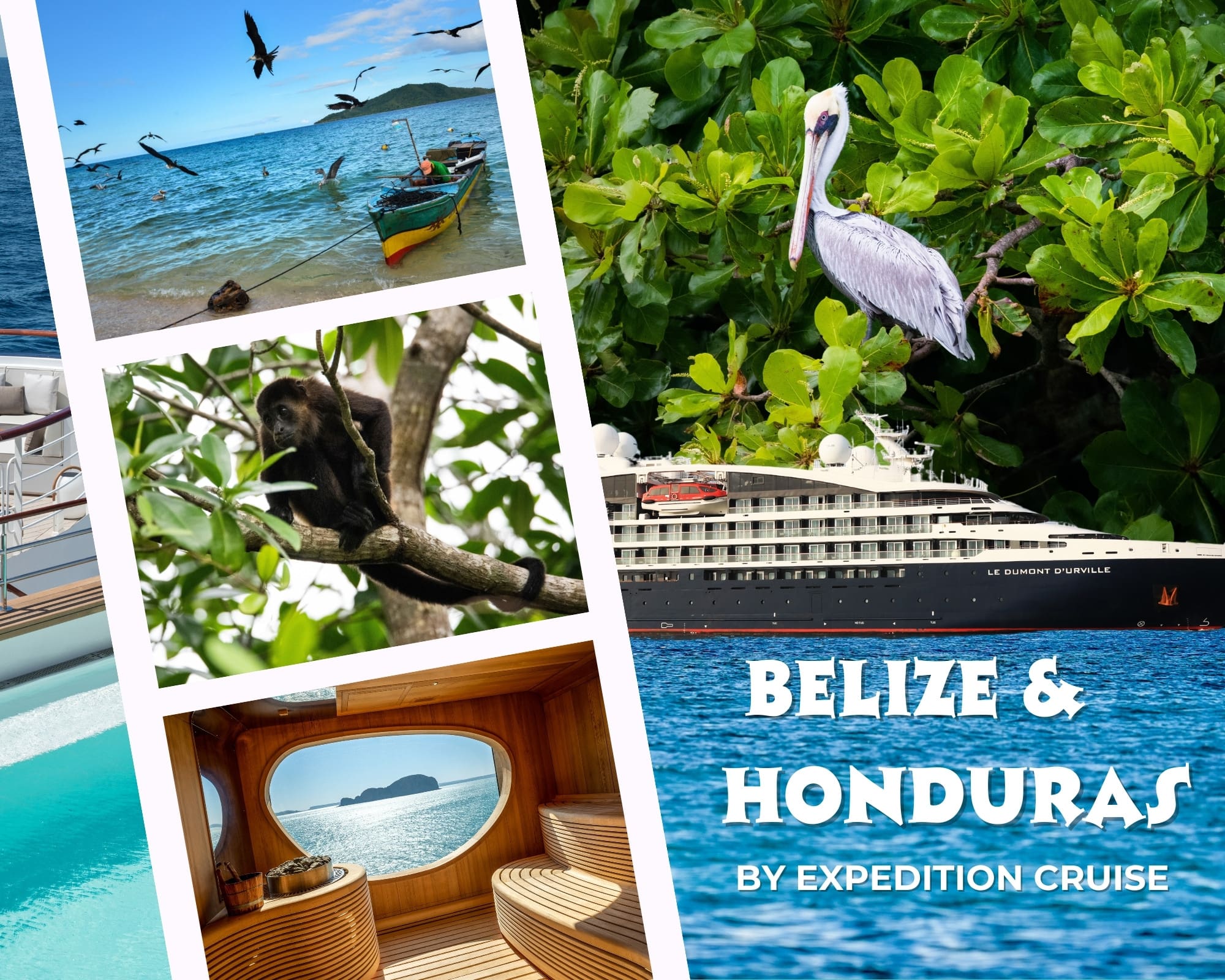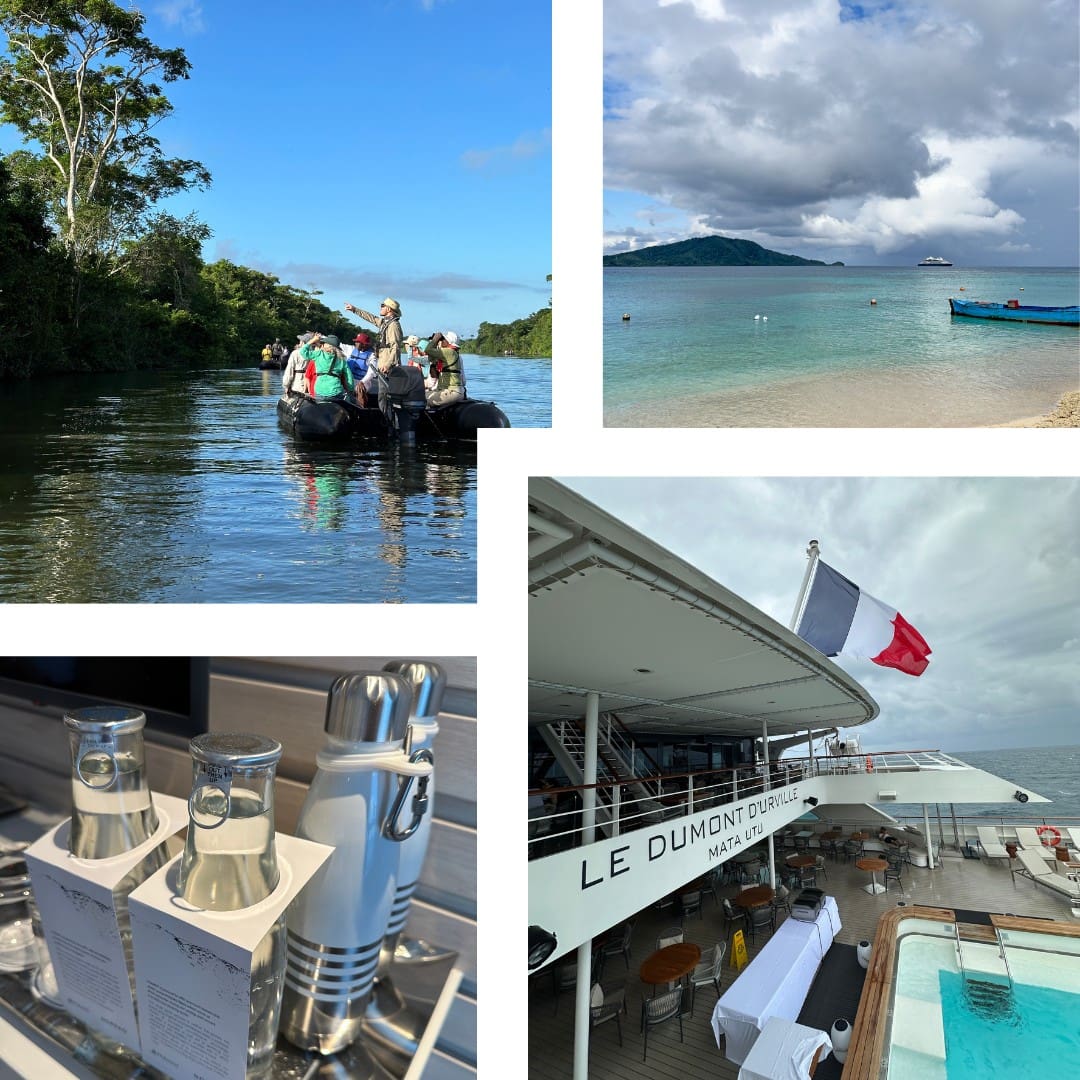
Travel advisor Shari Tucker embarked on a memorable and sustainable trip with Ponant
In December 2023, Halifax-based travel advisor Shari Tucker embarked on a new seven-night PONANT itinerary called Belize and Honduras: Unexpected Encounters and Nature on the expedition ship Le Dumont d’Urville.
“One of my professional goals for 2023 was to try my first expedition cruise,” Tucker tells Travel Courier. “The allure of off-the-beaten track destinations with fewer tourists, combined with a company who is having a positive impact through travel, is a sweet spot for me. This trip encompassed many firsts for me. It was my first time sailing with PONANT, my first time on a small ship — only 92 Staterooms — my first time on an expedition cruise and my first-time visiting Honduras.”
Tucker, who runs Love The Way You Travel, says the new eight day / seven night itinerary starts and ends in Belize City with sailings to multiple small islands and cays in Honduras and Belize was full of memorable moments.
“Our very first zodiac excursion in Punta Sal, Honduras took us to some rocky outcrops to view brown-footed boobys, frigate birds and pelicans before heading to Jeanette Kawas National Park for a hike through the rainforest. We started out with sunshine, but as we approached the rocky outcrops the wind picked up,” she says. “The barely existent waves from when we left the ship became swells of a meter plus and then the heavens opened up to a soaking downpour. While few people dream of downpours on vacation, this was all part of the adventure. The laughs we shared as a group on the zodiac as we rolled through the swells, wiping the teeming rain from our eyes was priceless. Sometimes it is the destination that is a highlight and sometimes it’s the people you experience it with along the way.”

Photos © l-r: PONANT/Nicolas Matheus; PONANT; PONANT/Minh T; PONANT/Margaux Coupez.
Other highlights of the trip included hearing about the Garifuna culture on the island of Chachahuate, seeing dolphins playing alongside the ship off the coast of Belize and the learning about the pottery making process in Guanaja with the opportunity to buy pottery directly from the artisans.
The new Belize and Honduras: Unexpected Encounters and Nature itinerary launched in November 2023 and will run again in November and December 2024.
To find out more about the expedition cruise experience and what travel advisors should know, Travel Courier caught up with Tucker upon her return.
What are the advantages of doing Belize and Honduras by ship VS a land tour?
Travelling to any country primarily by ship or by land is really a personal preference depending what you want to see and do. One is not better than the other, just different. Belize and Honduras by land will have a stronger focus on history and ancient ruins with a splash of visiting some of the Cays or islands accessible from the main cities for snorkelling, sailing and diving activities.
By land you’ll spend part of your days travelling by vehicle and then dine locally at night. By ship you’ll spend your days discovering local communities and doing water activities, then your evenings will be spent sailing while you are dining and taking in entertainment.
By large ship, you’ll visit a couple of main ports such as Belize City, Belize and Roatan, Honduras. There aren’t many ports equipped to accept large ships. By small ship you’ll visit remote island communities that have few tourists – you’ll likely to be the only ones!

Photos ©: PONANT/Margaux Coupez & Margot Sib.
Due to safety concerns in several of the big cities in Honduras, there aren’t a lot of options for multi-day land tours in the country. Most North American tourists stick to Roatan which is only a small part of Honduras or do a day trip to see the ruins from bordering countries.
As for Belize, it’s best to get outside of Belize City and venture into the countryside or out to the Cays to get the best the country has to offer.
By visiting these countries by small ship instead of land you can expect more nature and wildlife, more ocean and water activities and truly authentic cultural experiences. You’ll visit cays and islands that are barely touched by tourism and you’ll be far from the crimes that are prevalent in the big cities.
What should travel advisors know about expedition cruises?
Expedition cruising definitely has some major differences from the more typical large ship cruising. Large ships are about variety, options and have a ‘bigger is better’ mentality. Expedition ships are more about authenticity, education, conservation and an ‘off the beaten track’ mentality.
Size: Almost all expedition ships have less than 500 passengers. Many have 200 or fewer.
Dining: On expedition ships, you’ll find a main dining area or possibly two. You’ll have one or two dining options, but you are unlikely to have specialty restaurants that cost extra. Most expedition ships will have fresh, locally and sustainably sourced foods from the region you are travelling in. The main focus will be a la carte dining, with limited buffet options. Expedition ships will not have as much dining variety as a large cruise, but they don’t skimp on quality.

Photos © PONANT/Margaux Coupez.
Entertainment: The entertainment on expedition ships is usually low-key. Think lounge-style singing and dancing, small-cast theatre shows and informative lectures by expert naturalists on regional history, nature, wildlife and conservation. On board activities will be more focused on art, culture and education rather than concerts, Broadway or dance parties.
Excursions: With expedition ships you may or may not dock at a land port. Often the ship will be anchored at sea. Many of the excursions will be done right from the ship. You’ll board zodiacs that take you to wet or dry landings, or are your mode of transportation for nature and wildlife viewing. Excursions will be a mix of local history and culture, along with incredible wildlife viewing and adventure activities such as hiking, cycling, snorkelling or diving.
Expedition ships go to off the beaten path destinations with fewer travellers. To protect from over tourism and damage to the environment, many land and ocean activities have regulations on how many people can be there at once, so you’ll always be in small groups.
Sustainable travel is important to you… tell us about how this trip encompassed that?
Expedition cruising is rooted in science and conservation. Sustainability for PONANT is part of their DNA. They aren’t striving to keep up with the times because they are the leaders in implementing the cleanest fuel technologies for reduced emissions. They have been researching and advocating for many years for cleaner, safer oceans, protecting marine life and coral reefs. From the ship’s emissions to the treatment of waste on board, to respectfully interacting with remote communities, to educating travellers to become stewards of the environment, everything they do is rooted in having a positive impact through travel.

Photos © Shari Tucker.
With PONANT, their commitment to sustainability is visible on their website, throughout their marketing, in the documents provided to travellers and they follow through beautifully in all parts of the expedition itself.
As a start, and an absolute minimum, they had no single use plastics on board. Straws were made of hard pasta. Reusable water bottles were provided for everyone and water stations were available. Ocean water is treated with NORDAQ filters to become drinking water. It isn’t transported or stored, reducing the carbon footprint. It is collected while sailing, produced in small batches and provided daily in glass jars in each stateroom.
PONANT, being a French company, uses locally and sustainably sourced meat, seafood and produce from the region where you are travelling, but it is always prepared with a French flare. Sourcing locally reduces carbon footprint from a shipping perspective, but also supports the communities and locals in each region. We had delicious Red Snapper for lunch at the Grill one day and the chef was proud to tell us it had been sourced from a local fisherman.
When it comes to benefiting locals and communities it was truly amazing to see. In most cases we would be the only visitors that day, and in some cases, the only visitors the entire week. With only 184 passengers on board, this is a stark difference from multiple ships of 2000 plus passengers converging on popular ports, daily.
These remote islands and cays simply don’t have access to mass tourism due to their location. And let me make this clear… they do not want it. Access to mass tourism would immediately do damage to their homes, communities, environment and natural resources. However, having a small, controlled piece of the tourism pie provides them access to new income streams when economic options are limited in their remote locations.

Photos © Shari Tucker.
Chachahuate is an island community of 80 Garifuna people in the Bay Islands of Honduras. Due to climate change the sea levels are rising and they have already lost homes to the ocean as their island literally washes away. They’ve limited visitors to 30 at a time. This allows them to show their small community without overwhelming the locals. It allows them to cook snacks to give travellers a taste of their local cuisine without depleting their resources.
In this community and culture, families work together and share the rewards. You’ll find them taking turns performing dance and drumming demonstrations, as well as different families cooking for tourists on different days. Rather than the funds for these services going to the specific family who worked that day, the funds are shared with the entire community because everyone pitches in on a rotational basis. This also means the money provided to the community from tourism is 100% controlled and distributed by the community.
To know the money is directly benefiting an entire community rather than just one person is incredibly powerful.
Have you sold or travelled with PONANT before?
While I’ve not sold or travelled with PONANT previously, what particularly attracted me to them was their incredible commitment to sustainability and off the beaten track itineraries. On board the Expedition Team was incredible and the public presence of the Captain was noteworthy. The Expedition Team were incredibly knowledgeable, passionate, friendly and charismatic. The Captain was always there to help us on and off the zodiacs. He did a lecture on the history of expedition cruising and he danced with guests during our final gala evening. These are the joys of small ship experiences that you don’t know make a difference until you experience them yourself.

Photos © Shari Tucker.
Do you have any tips to share for advisors looking to sell more expedition cruises?
- Go try it for yourself so you can speak passionately about it from experience and share stories of your adventures with your clients.
- Position it to be about the adventure, the off-the-beaten track destinations and the unique experiences rather than about cruising in general. Although the ships are very important in expedition cruising and have some unique features, I truly believe it is the experiences and destinations that sell expeditions. After travellers are sold on the destination, then they’ll want to know the ship’s features and company’s unique selling points.

















